

— Products —
 Consumer hotline +8618073152920
Consumer hotline +8618073152920 WhatsApp:+8615367865107
Address:Room 102, District D, Houhu Industrial Park, Yuelu District, Changsha City, Hunan Province, China
All products
Portable soil testing devices are compact and handheld tools designed to provide quick and convenient analysis of various soil parameters. These devices offer a practical solution for farmers, gardeners, landscapers, and researchers who need to assess soil conditions on-site without sending samples to a laboratory. Here are some common types of portable soil testing devices:1. pH Meters.2. Moisture Meters.3. EC/Salinity Meters.4. NPK Test Kits.5. Soil Thermometers.
Tel/WhatsApp:+8615367865107
Email:Arvin@niubol.com +Nearly 100 partner company in more than 68 countries. We are committed to providing high-quality, practical products to meet your needs and help you solve problems.Product Details
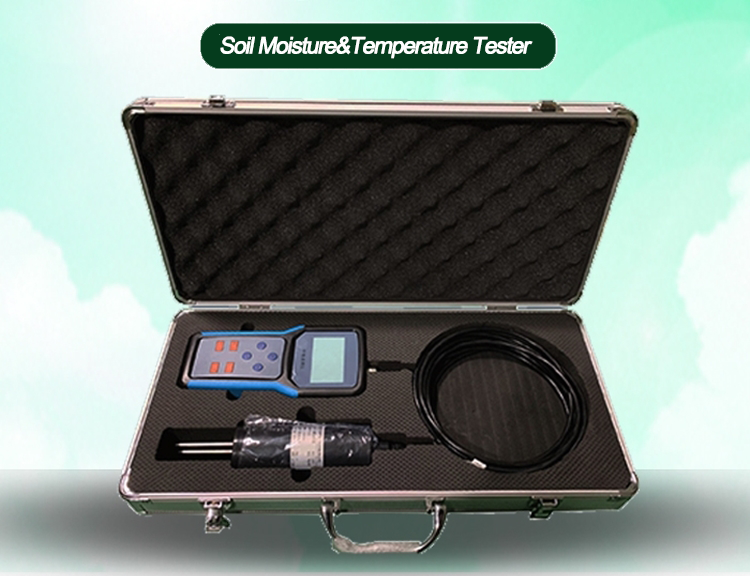
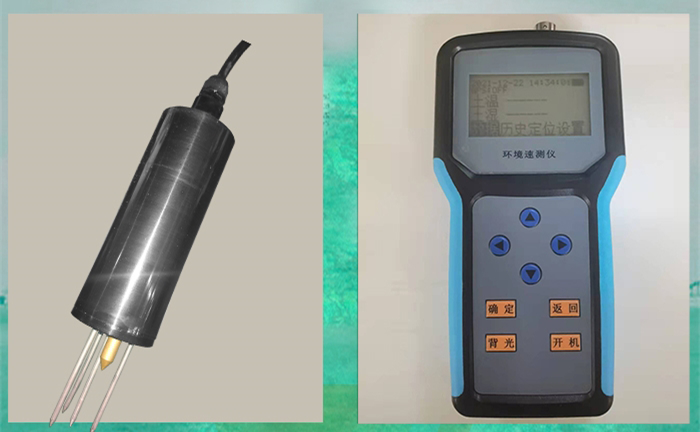
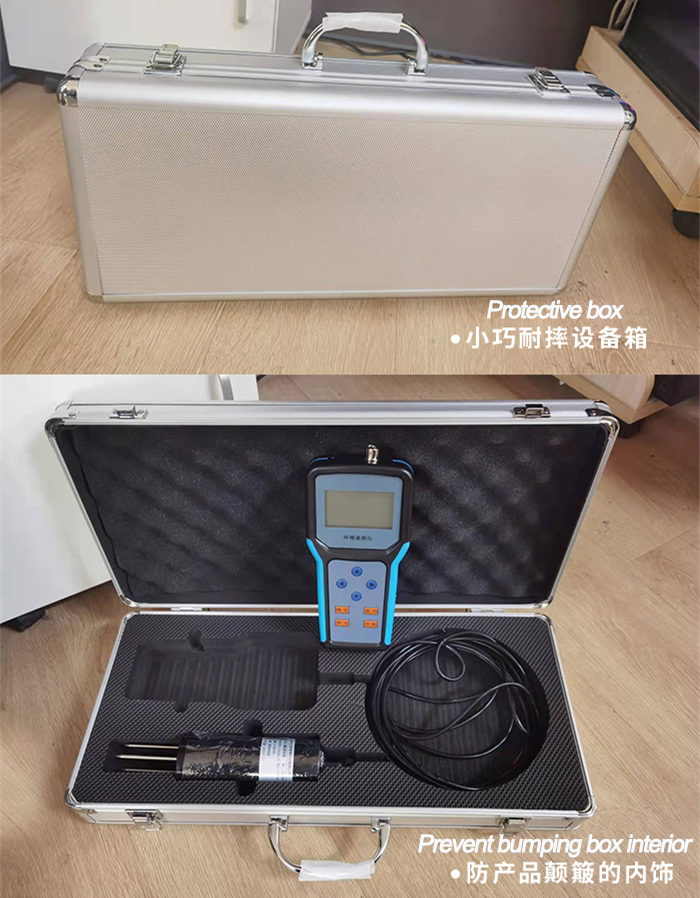
Portable Soil Temperature and Moisture testing device
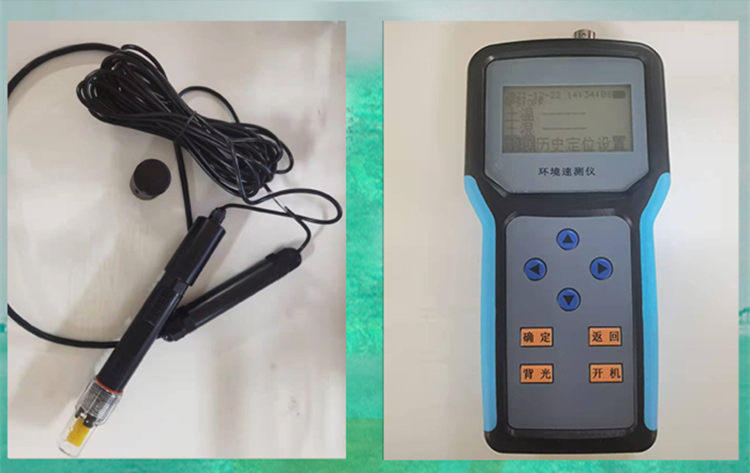
Portable Soil PH testing device
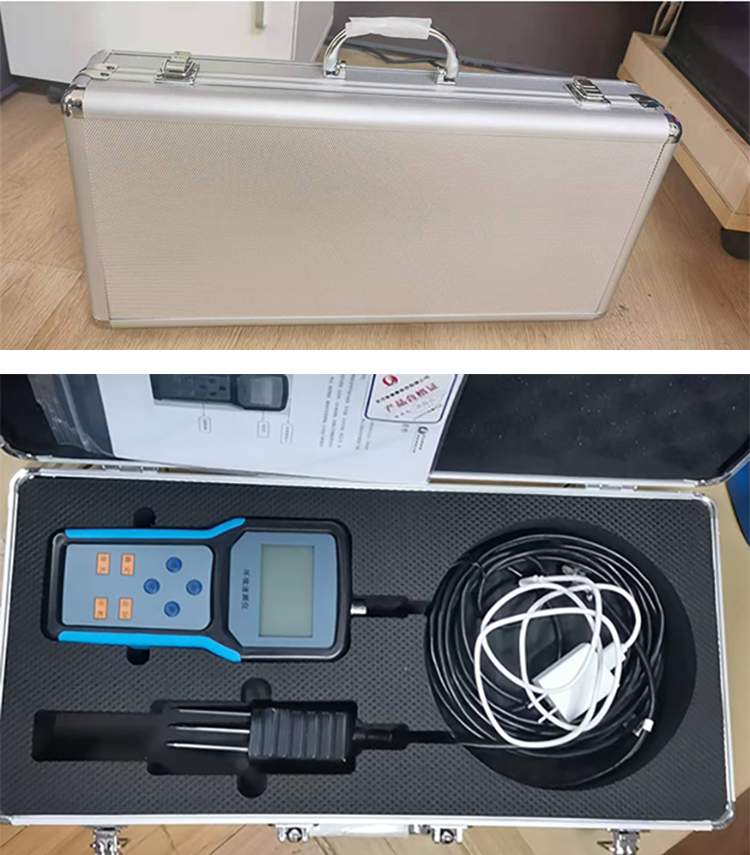
Portable Soil Temperature and Humidity Conductivity Salinity testing device
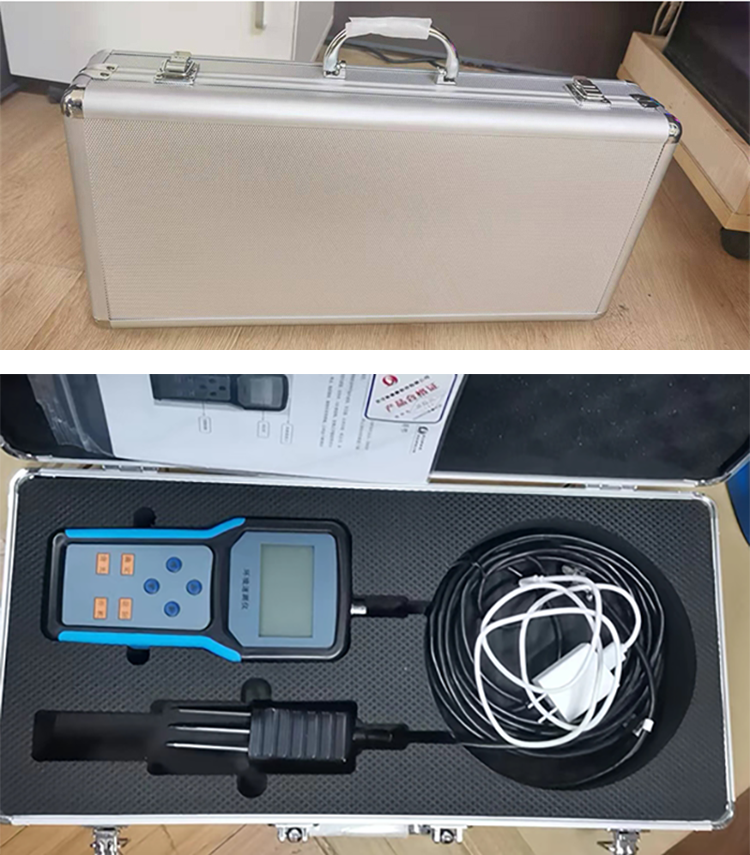
Portable Soil NPK testing device
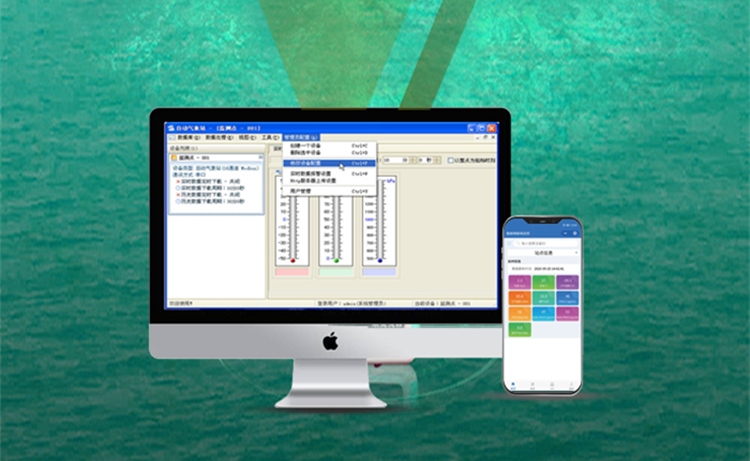
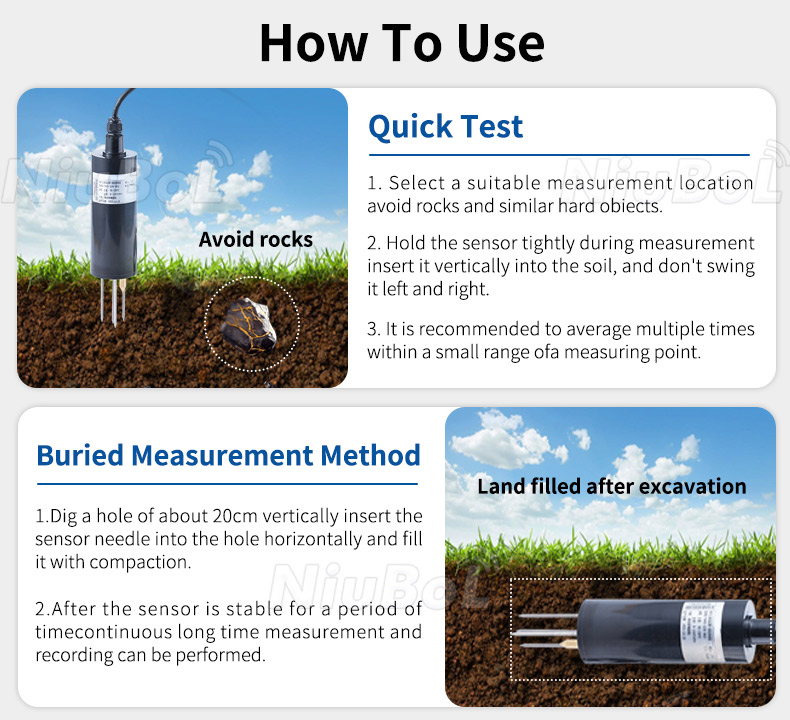
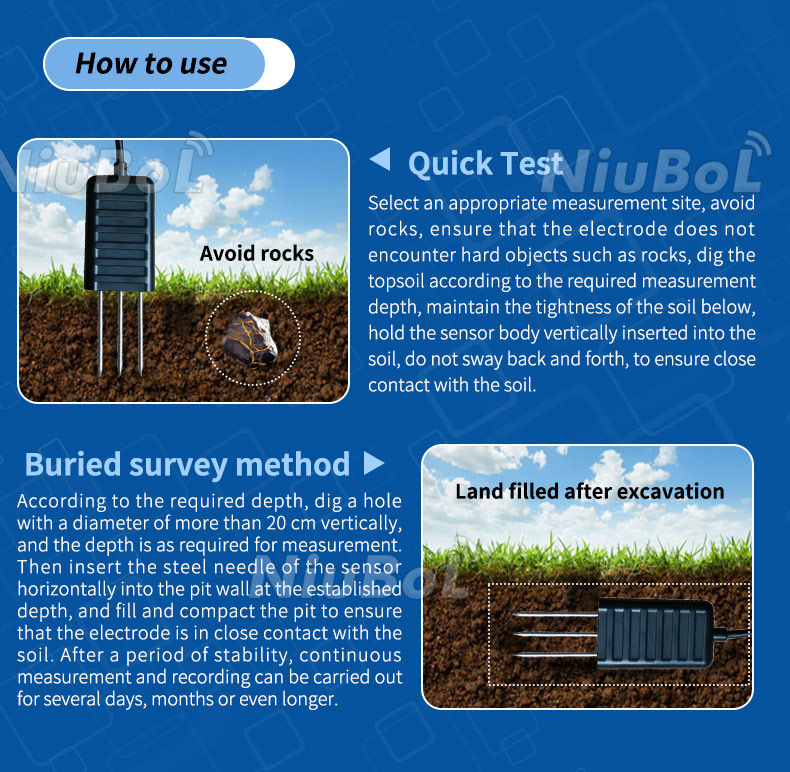
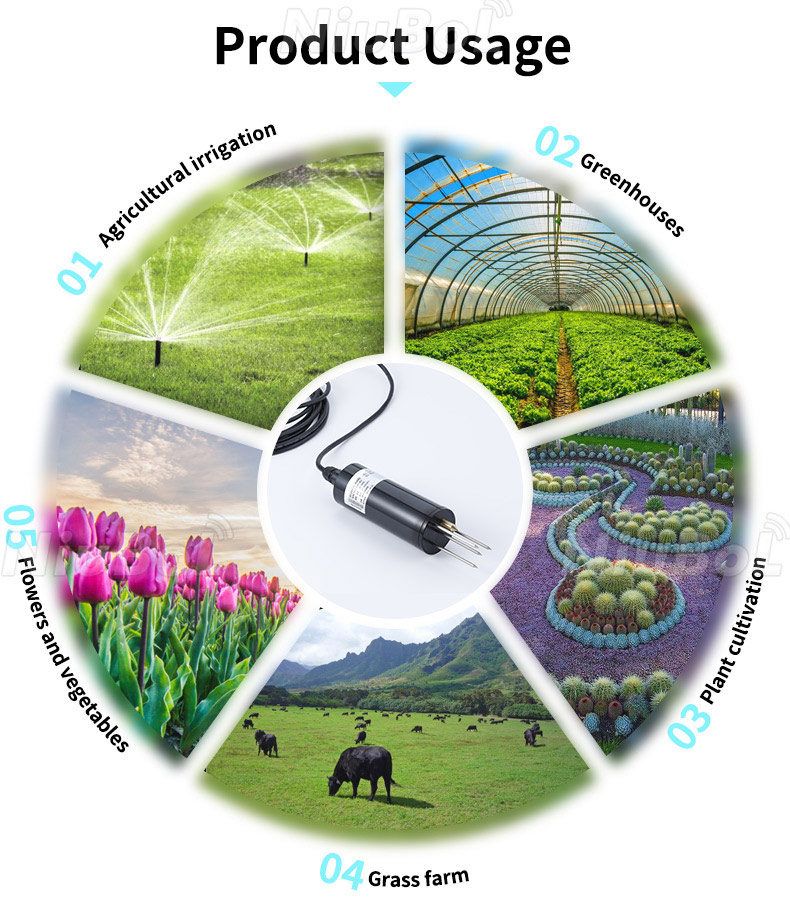
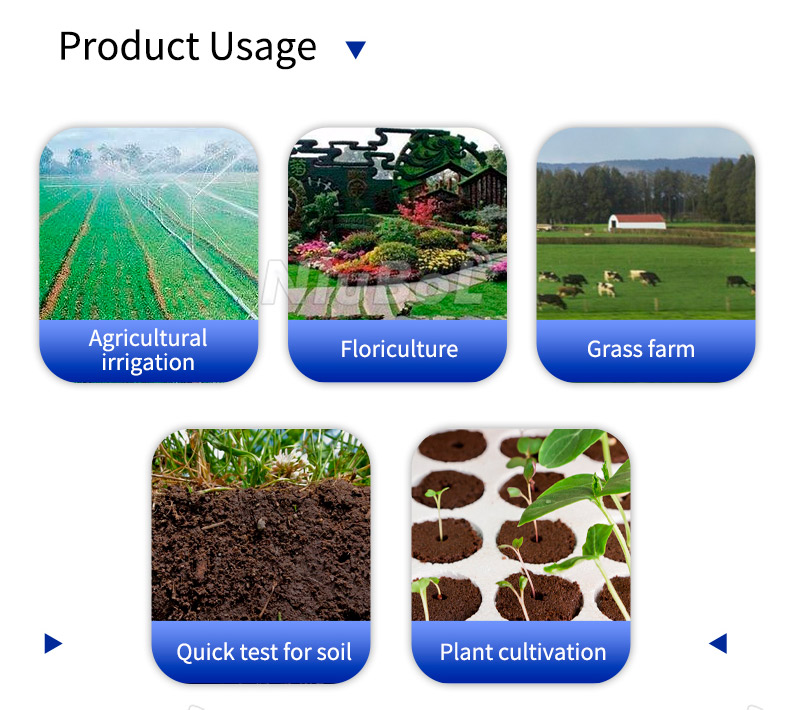
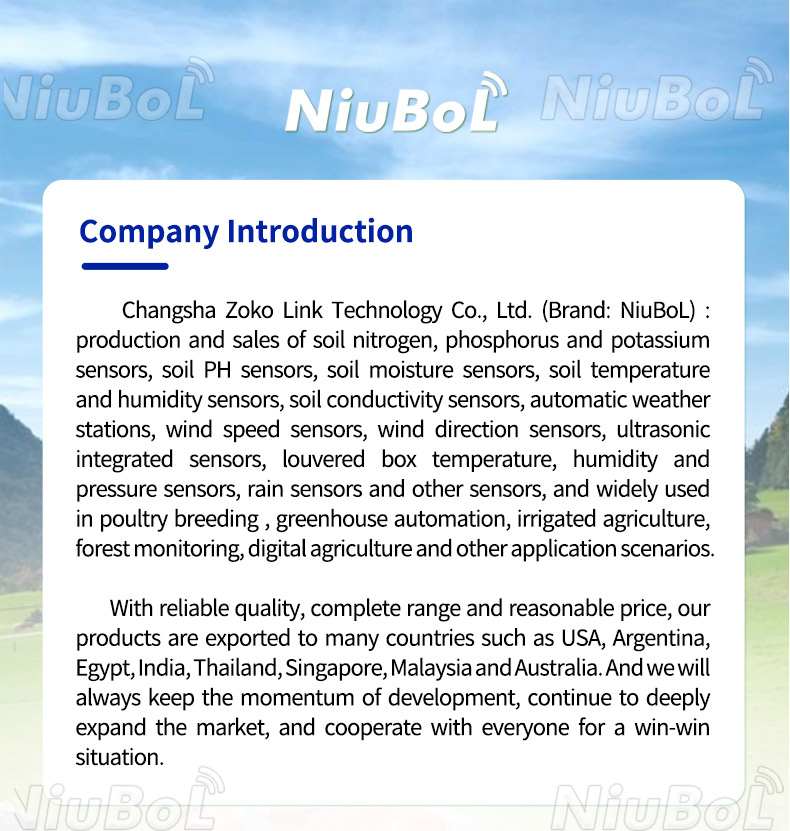

Portable soil testing device technical parameter:
| Soil temperature | |
| Range | -40~80°C; |
| Resolution | 0.1°C; |
| Accuracy | ±0.5°C |
| Soil moisture | |
| Range | 0-100%RH |
| Resolution | 0.1%RH |
| Accuracy | ±5% |
Soil Salinity | |
| Range | 0-8000mg/L |
| Resolution | 1mg/L |
| Soil conductivity | |
| Range | 0-10000us/cm |
| Resolution | 1us/cm |
| Accuracy | ±5% within the range of 0-10000us/cm |
Supply voltage | DC12V |
| Signal output | RS485, Modbus protocol |
| Protection level | IP68 can be used for a long time when submerged in water. |
| Operating environment | -40~85°C |
| Probe material | anti-corrosion special electrode |
| Sealing material | black flame retardant epoxy resin |
| Installation method | all buried or all probes inserted into the measured medium |
| Default cable length | 5 metres, cable length can be customised according to requirements |
| Soil PH | |
| Range | 0-14 pH |
| Resolution | 0.01ph |
| Accuracy | ± 0.1pH |
Soil Tester Features:
1.128x64 large screen LCD display measurement parameters;
2. Large -capacity data storage, up to 40,960 data can be stored;
3. GM USB communication interface, convenient data download;
4. System language can be freely switched between English and Chinese;
5. Lithium battery power supply, low power design, long standby;
6.Communication: USB; storage: 40,000 pieces of data;
7. Host size: 200mm*105mm*28mm; weight: 0.5kg;
8.Working environment: -20 ℃ -80 ℃; 5%RH-95%RH;
Soil moisture and Temperature Tester application:
Soil temperature and humidity sensors monitor the moisture content of the soil and provide scientific data for the rational use of soil and water resources. By obtaining real-time monitoring data, the user can learn about the ecological conditions in grassland, farmland and forests.
Soil temperature and humidity sensors are widely used in scientific experiments, water-saving irrigation, greenhouses, flowers and vegetables, meadows and pastures, soil testing, plant cultivation, sewage treatment, food storage and the measurement of the water content and temperature of various particles, soil temperature and humidity will use its own excellent performance to serve agricultural production.
Soil temperature and humidity measurement instruments measure the temperature and humidity of the soil. The soil temperature and humidity measurement instrument is a professional instrument that can measure the humidity content and soil temperature in the soil. The soil temperature and humidity measurement instrument can quickly understand the temperature and humidity data of the soil, and can arrange reasonable irrigation work through the comprehensive comparison of historical soil temperature and humidity data, thereby improving crop yield.
Portable soil ph testing device
There are several portable soil pH testing devices available on the market. These devices are designed to provide quick and accurate readings of the pH level in soil samples. Here are a few popular options:
1. Soil pH Meter: This is a handheld device with a probe that you insert into the soil. It measures the pH level and displays the results on a digital screen.
2. Soil pH Test Strips: These are paper strips coated with a chemical indicator that changes color based on the pH level. You can simply insert the strip into the soil and compare the color change to a provided chart to determine the pH level.
3. Soil pH Pen: Similar to a pH meter, this device has a probe that you insert into the soil. It provides a digital readout of the pH level and often includes additional features like temperature measurement.
Portable Soil ph Tester Application Scenario
Portable soil pH testing devices are useful in a variety of applications, including:
1. Agriculture: Farmers and gardeners can use portable soil pH testing devices to determine the pH level of their soil. This information can help them select the appropriate crops or plants to grow and identify any necessary soil amendments to improve plant growth.
2. Landscaping: Landscape professionals can use portable soil pH testers to assess the soil pH of gardens, lawns and other landscaping projects. This data can be used to adjust the soil's pH to ensure healthy plant growth.
3. Environmental monitoring: Portable soil pH testers can be used to monitor soil pH levels in areas that have been impacted by pollution or other environmental factors. This information can help identify areas where remediation efforts may be necessary.
4. Research: Researchers in fields such as soil science, ecology, and environmental science may use portable soil pH testers to collect data in the field for their research projects.
Overall, portable soil pH testing devices are a valuable tool for anyone who needs to quickly and accurately assess the pH level of soil in a variety of settings.
4 in 1 Portable soil testing device
4 in1 Portable soil testing devices temperature, humidity, electrical conductivity (EC), and salinity. These devices can be useful in a variety of applications including:
1. Agriculture: Farmers and growers can use these devices to monitor the temperature and humidity levels in their soil and optimize irrigation scheduling. Measuring EC and salinity can also help guide fertilizer and nutrient management decisions.
2. Environmental Monitoring: Portable soil testing devices with multiple sensors can help environmental professionals monitor soil conditions at contaminated sites or other areas where land use changes have occurred.
3. Construction: Soil testing devices can be used to assess soil suitability for construction projects. Temperature and moisture monitoring can help ensure proper soil compaction for foundations, while EC and salinity measurements can help identify potential corrosive soils that could impact infrastructure longevity.
4. Research: Scientists and researchers can use portable soil testing devices to collect data in the field for their research studies.
Portable soil testing devices are compact and handheld tools designed to provide quick and convenient analysis of various soil parameters. These devices offer a practical solution for farmers, gardeners, landscapers, and researchers who need to assess soil conditions on-site without sending samples to a laboratory. Here are some common types of portable soil testing devices:
1. pH Meters: These devices measure the acidity or alkalinity of the soil by analyzing the concentration of hydrogen ions (pH level). They typically consist of a probe that is inserted into the soil sample, and the pH results are displayed on a digital screen.
2. Moisture Meters: Moisture meters help determine soil moisture levels, which are crucial for efficient irrigation and plant health. They often employ electrical conductivity or capacitance sensors to measure the water content in the soil.
3. EC/Salinity Meters: Electrical conductivity (EC) and salinity meters assess the salt content in the soil. These devices measure the ability of the soil to conduct an electrical current, which provides an indication of the salinity level.
4. NPK Test Kits: Some portable soil testing kits allow users to estimate the levels of essential nutrients such as nitrogen (N), phosphorus (P), and potassium (K) in the soil. These kits often rely on chemical reactions or colorimetric assays to provide approximate nutrient concentrations.
5. Soil Thermometers: Soil thermometers are specialized thermometers designed to measure the temperature of the soil. They can be inserted into the ground to monitor soil temperature, which impacts seed germination, microbial activity, and nutrient availability.
These portable soil testing devices offer convenience, speed, and immediate feedback for soil analysis. However, it's important to note that their accuracy may vary compared to laboratory testing methods. It's recommended to calibrate and follow the manufacturer's instructions for optimal results.
Sensors & Weather Stations Catalog
Agriculture Sensors and Weather Stations Catalog-NiuBoL.pdf
Weather Stations Catalog-NiuBoL.pdf
Related recommendations
 Multi-Depth Soil Sensor RS485
Multi-Depth Soil Sensor RS485 TDR Soil Moisture Sensor
TDR Soil Moisture Sensor Pyranometer Solar Radiation Sensors
Pyranometer Solar Radiation Sensors Soil ph sensor
Soil ph sensor Tipping Bucket Rain Gauge
Tipping Bucket Rain Gauge Air Temperature and Humidity Sensor
Air Temperature and Humidity Sensor
Screenshot, WhatsApp to identify the QR code
WhatsApp number:+8615367865107
(Click on WhatsApp to copy and add friends)